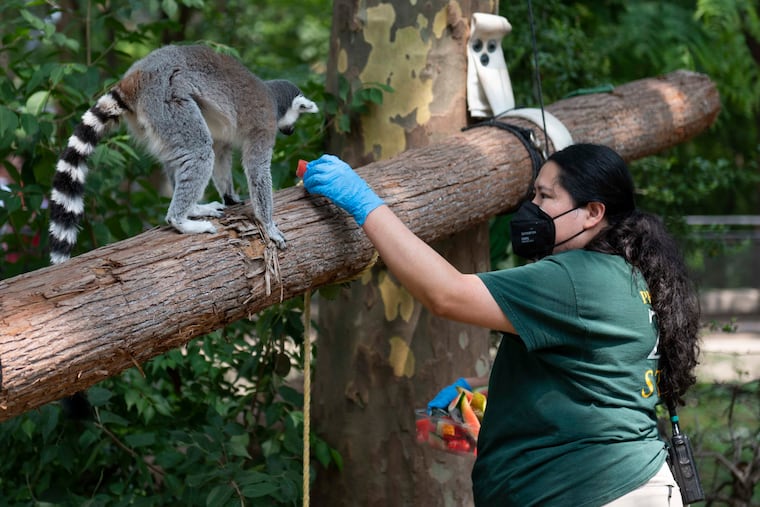Philadelphia Zoo workers focused on animal welfare and staff safety as they negotiated a post-pandemic contract
“Safety is an interest on both sides," said Rachel Metz, the zoo’s vice president of animal well-being.

Unionized employees of the Philadelphia Zoo have a new contract, including new safety rules meant to protect both workers and animals, as well as pay bumps and new benefits intended to help fill vacancies and reduce staff turnover.
The agreement addressed pain points that arose after the zoo reworked its operations amid the first year of the COVID-19 pandemic. The contract came just weeks after the accidental death of five meerkats put a spotlight on safety and training procedures at America’s first zoo, but staff had already been sounding an alarm before that incident, according to the union.
“We expressed serious concerns to zoo management about the effectiveness of existing safety and training protocols and about staff turnover rates,” Ellie Caruso, president of the zoo union, AFSCME Local 752, said in a statement about the new contract. ″It’s essential for the future of the Philadelphia Zoo and the animals we love and care for that we have all the tools we need to provide the highest quality care, and that includes competitive pay.”
“Safety is an interest on both sides. We’re both going to work hard to implement the safest procedures,” said Rachel Metz, the zoo’s vice president of animal well-being. “The contract that we came up with has collective advantages and improvements on both sides.”
The union includes zookeepers, animal care workers, groundskeepers, heavy equipment operators, and other maintenance personnel, 91% of whom approved the contract on July 20. According to union officials, they reached a tentative agreement just before their contract was set to expire on July 14, after nine weeks of bargaining and a two-week contract extension.
The union’s worries stemmed from a restructuring plan the zoo rolled out in 2020, said April Gigetts, president of AFSCME District Council 47, who worked with the zoo employees on contract negotiations.
The goal of the restructure was to improve animal welfare and enhance guest experience, Metz said.
It also involved cross-training keepers so they could move around between collections, Gigetts said.
“In theory, that’s a good idea,” Gigetts said. “What that looked like, we weren’t exactly in agreement” before contract negotiations began.
It was unclear to staff when the restructure was rolled out how frequently they would have to move between collections.
“The lack of clarity created angst among the workers,” Gigetts said. “It’s important that if you are working with [a particular animal] you become that subject-matter expert.”
No more toxic dye
The zoo saw five meerkats suddenly die in June from an accidental poisoning. In the days afterward, one zookeeper who asked to remain nameless so they could talk freely told The Inquirer that high staff turnover and rushed training for new zookeepers contributed to the deaths.
Metz said the investigation of the incident is complete and confirmed that the animals were poisoned by a dye the zoo had used for decades to help with identifying similar-looking animals. The zoo immediately stopped using the dye, Metz said.
“I have a lot of faith in the animal care team and our veterinary team and our dietary team,” she said. “We don’t deal with these things on a regular basis.”
Asked if the investigation revealed any needed improvements in staff training, Metz said all keepers go through multiple stages of training.
“We want to avoid putting people into positions where they’re uncomfortable or aren’t knowledgeable or skilled,” she said.
The zoo is in the process of acquiring a new group of meerkats, Metz said.
Gigetts declined to comment on the meerkat incident.
Addressing turnover challenges
Along with COVID-19 related challenges, the restructuring contributed to turnover, Gigetts said, estimating that 25% of positions were vacant at one point. People were told they would have to reapply for their jobs at the outset, she said, and some found that “offensive.” Vacancies led to more overtime and burnout among remaining staff, she said.
Metz said nobody lost their job because of the reapplication process, adding that asking employees to reapply was a legal requirement under their union contract because job titles changed. There were a lot of staff departures around that time, she acknowledged, but the zoo never reached a point where animal safety was compromised because people were willing to take on extra hours and duties.
The new contract includes the addition of six staff positions, and the zoo is in the process of filling existing vacancies, Metz said.
The new contract also clarified job titles and how various roles are trained, Metz and Gigetts said. Employees who haven’t worked with a specific collection in six months will undergo training to get re-familiarized with those animals.
In addition to safety policies, the new contract includes four weeks of paid parental leave, as well as raises of at least 12.5% over three years, and as high as 18% for some tradespeople. Keepers who are not at the “lead keeper” rate will get an additional pay bump, removing a pay hierarchy between keepers.
“We felt like that would help in the recruitment and retention for the zoo and filling those vacancies,” Gigetts said.